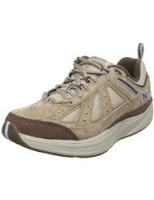Toning
shoes – sometimes called as rocker bottom shoes and wellness shoes – are a special
type of athletic shoes that have unstable soles. Toning shoe companies’ claim
that their product has benefits like muscle development and the ability to slim
the user’s leg and calves. Toning shoe lawsuits have been filed against
companies because of alleged misleading statements, false advertising claims,
and physical injuries.
This
type of lawsuit case generally falls into negligence or tort, and more
specifically, to product liability.
Kick-Off of Toning Shoes Into The Market
There
was a fiery start when toning shoes went into the market. As celebrities and
famous individuals endorsed the product, more people were interested in buying
toning shoes. The product was advertised as a shoe that can help people be
healthy and get into shape just by wearing it while walking or running. The
shoes have an unstable sole or “rocker bottom” which means that it will provide
instability while walking or running. Because of this instability, a person’s
muscle needs to work harder during an activity while wearing the shoe.
According
to The New York Times, $1 billion worth
of toning shoes were sold in year 2010 alone. Reebok leads the line with more than 5 million pairs sold.
Companies
that have toning shoe products are the following:
- Reebok – EasyTone
- MBT (Masai Barefoot Technology)
- Skechers – ShapeUp
- New Balance – True Balance
- Champion – Pace Toning Shoe
- AVIA – iBurn, iQuest, iTone
Critics
and some doctors argue that toning shoes doesn't work and may cause injuries
instead. Some known injuries connected with the product include joint injuries,
tendon ruptures, stress fractures, and muscle fatigue. A person might also fall
to the ground and have wrist fractures, ankle fractures, and the most serious
of all, head and brain injury.
Toning Shoes Lawsuit – Product Liability and Settlement
A
consumer can sue a product manufacturer or distributor if the product he/she
bought caused injury and damage. The manufacturer can also be sued if they
provided false claims and statements regarding the product.
On
2011, a lawsuit was filed against Skechers Shape-up. The plaintiff was a woman
named Holly Ward. She allegedly developed stress fractures as a result of
wearing the toning shoes while working as a waitress. In September of the same
year, Reebok paid $25 million in settlements to a lawsuit filed by the United
States Federal Trade Commission. The basis was that the company’s claims were
misleading.

